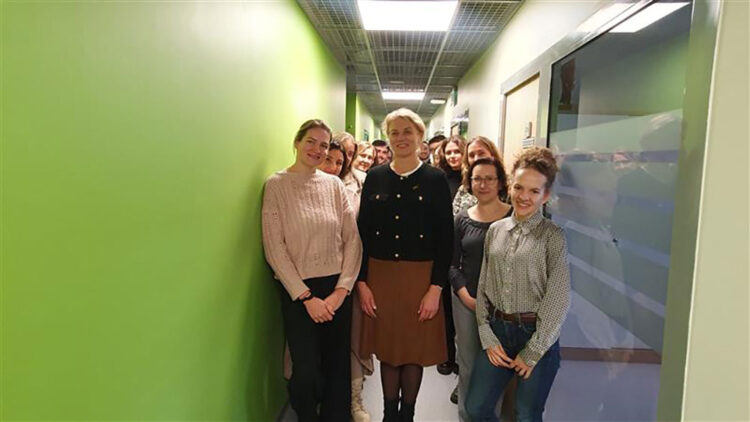Researchers at Vilnius University have developed an effective approach to liquid biopsy that contributes to the field of non-invasive cancer detection methods, with significant implications for personalised medicine.
“Our team has successfully detected tumour DNA in urine samples, contributing to the development of liquid biopsy techniques,” says Professor Sonata Jarmalaitė from Vilnius University’s Life Sciences Centre. This research enables monitoring of cancer progression by analysing DNA fragments released by tumours into bodily fluids—particularly valuable for cancers where traditional biopsies present challenges.
Vilnius University Scientists – Pioneers of Liquid Biopsy
“Bodily fluids passing through tumours collect nucleic acids from dead tumour cells. Tumour DNA in saliva, urine, and other fluids provides a valuable diagnostic tool. We were among the first to detect tumour DNA in urine, making us pioneers of liquid biopsy in Lithuania,” says Prof. Jarmalaitė.
The team’s research focuses on detecting circulating nucleic acids in urine, which are linked to prostate and bladder cancer, and potentially breast cancer: “We specialise in minimally invasive diagnostics. Urine is entirely non-invasive and ideal for research, especially since cancer patients often have fragile blood vessels.
Liquid biopsy allows monitoring of cancer progression, particularly after tumour removal. “Detecting tumour DNA can indicate potential metastases. This represents a breakthrough in oncology for both diagnosis and monitoring,” notes Prof. Jarmalaitė.
She added, that liquid biopsy is already used clinically in some lung cancer protocols. We implemented it at the National Cancer Institute efficiently—the technology developed over 25 years, but with the right expertise, we introduced it in just two weeks.
Epigenetic Markers for Non-Invasive Diagnostics
Beyond genetic studies, the Vilnius University team works closely with clinicians on epigenetic research, particularly for kidney cancer.
“We have developed a set of epigenetic markers that can be tested using liquid biopsy from urine samples,” Professor Jarmalaitė explains. “This is particularly relevant for kidney cancer, where traditional biopsy is a complex procedure.”
The researchers note that kidney cancer diagnosis is occurring at younger ages, yet the disease often remains asymptomatic until advanced stages. While imaging techniques have improved early detection, there remains a significant need for molecular markers.
“Our collaboration with clinicians aims to develop tools useful for early kidney cancer detection. A key challenge is determining when a kidney tumour requires removal or treatment versus monitoring. Our genetic and epigenetic markers may complement imaging techniques in making these distinctions,” says Professor Jarmalaitė.
Baltic Region Cancer Research Collaboration
The Vilnius team participated in the UK-funded “Mutographs” research project, studying regional variations in cancer incidence, with particular attention to the higher rates of kidney cancer in Lithuania and neighbouring countries.
Their research identified a mutation signature present in the Baltic region and Poland that differs from patterns associated with common risk factors like smoking or alcohol consumption.
“We’ve identified a genetic profile that suggests region-specific factors may play a role in our higher kidney cancer rates,” Professor Jarmalaitė explains. “The sequencing analysis was conducted at the UK’s Sanger Institute, where an algorithm linked mutation profiles to potential carcinogenic exposures.”
This research follows a methodology similar to previous Sanger Institute work that identified aristolochic acid in herbal remedies as the cause of kidney cancer clusters in other European regions. While the specific environmental factor in the Baltic region remains unidentified, the research provides valuable direction for further investigation.
Advancing Personalised Medicine Through Liquid Biopsy
The implications for personalised medicine are substantial, as liquid biopsy enables more frequent and less invasive monitoring of cancer progression.
“In precision medicine, doctors need to administer specific drugs at the right time and in precise concentrations. This cannot be done without accurate genetic information,” explains Dr Sabaliauskaitė. “Currently, we track cancer progression using blood-based liquid biopsy, but urine-based methods show promise for simpler application.”
The team is developing specialised tests for monitoring small kidney tumours that may not require immediate intervention—potentially helping clinicians make more informed treatment decisions and sparing patients unnecessary procedures while ensuring timely intervention when needed.
“Prescribing precision medicine drugs requires an accurate genetic diagnosis. Doctors need to know exactly which genetic mutations are present to choose the appropriate treatment,” adds Professor Jarmalaitė. “The effectiveness of precision medicine drugs is significantly higher when properly matched to the patient’s genetic profile, improving survival rates.”
The research highlights the importance of genetic counselling and family history collection, as approximately 10% of kidney cancer cases are hereditary. The researchers note that fewer such cases are diagnosed in Lithuania, likely due to less frequent genetic testing.
As genetic and epigenetic testing becomes increasingly central to cancer treatment globally, this research from Lithuania represents a practical contribution to the field of personalised cancer medicine.













